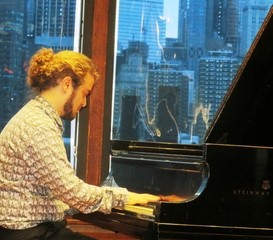|
Back
Whizzing Through the Musical Wormhole New York
BargeMusic
05/10/2019 -
Henry Purcell: Ground in C Minor, ZD 221
Jean-Philippe Rameau: Prélude from Suite in A
Johann Sebastian Bach: Prelude and Fugue in G Minor, BWV 885
Leo Ornstein: Semplice from Sonata No. 4 – A Morning in the Woods – Joy from Three Moods
Andreas Foivos Apostolou: A View from the Golden Gate – Metamorphosis – Synchronism 35 – Panmixia
Andreas Foivos Apostolou (Pianist)

A. F. Apostolou at BargeMusic (© Samuel A. Dog)
“I’m really interested in writing a piece of music that will move you, that will really move you. That is the only reason I’m writing music.”
Leo Ornstein (1895-2002)
First, the bad news. Andreas Foivos Apostolou did not perform Leo Ornstein’s Suicide on an Airplane.
In his recital last night at BargeMusic, the Greek-born American artist leaped from 1700 to 2000 in a fraction of a keyboard, and dazzled the audience three Ornstein pieces that were pleasant, difficult, impressionistic...
But Suicide on Aa Airplane ? That’s a four-minute work written on three staves, making George Antheil sound like Georg Telemann. And one of the keys unlocking this most fascinating artist.
Mr. Apostolou spoke at length about the composer, and one of Ornstein’s granddaughters was in the audience to hear the composer extolled. First, his age. He was probably born in 1892 or 1895, just in time for the premiere of Mahler’s Third Symphony. He died in 2002, theoretically hearing the premiere of Elliott Carter’s Three Illusions. And in those 107-odd years, after fleeing Russia during the Cossack pogroms in Ukraine, he became a successful concert pianist playing Busoni, Schoenberg, Stravinsky, all the avant-garde composers. He was also a composer whose music could be violent, lyrical, eccentric, pyrotechnical, rhapsodic, and he was compared to Stravinsky, Schoenberg, Varèse and, yes , George Antheil.
Henry Cowell, in fact, stated that Leon Ornstein “startles the world.”
Yet, like that other eccentric, Glenn Gould, he gave up concertizing altogether at the age of 40. He still wrote prodigiously, he ran a conservatory with his wife, but he refused to publicize himself. And when he died...
Well, he had the obituaries. But his music is only now resurrected for the concert stage.
One of the three works played last night was a tribute to Ornstein the technician. Joy was the last of Three Moods, and it was more than joy. The short piece was ecstatic, rollicking, it embraced mad finger work on the keys, and whole sections written in minor seconds. A whirlwind! A hysteria. Debussy could have written it as an etude, especially with its sarcastic middle section. And yes, the young Andreas Foivos Apostolou was able to master it with no seeming problems at all.
The pianist played two other Ornstein works–far far too few–which showed the Janus side of this multi-faced composer. Semplice, the second movement of his Fourth Sonata could have been written by Erik Satie. A simple waltz, a development into strange keys, then back to the waltz. (The whole sonata is very different, far more adventurous.)
Ornstein’s A Morning in the Woods hardly sounded Ukrainian (his birthplace) or Russian (education) or American (his home). It was vaguely Impressionistic, but hardly as visual as the title. Yes, there was a fluidity, a firm structure, but the “Woods” rambled onto strange dissonant paths, changed meters and moods. It was partly Ives, partly Medtner/Rachmaninoff, and yet, on first hearing, certainly original.
The Ornstein works were not only the center but the apogee of a strange but satisfying recital.
The first three works were early 18th Century, from England, France and Germany. He started with one of Henry Purcell’s chaconnes (an A Major Ground), where he showed how to use a light legato on the right hand, a more stern repeated theme down on the bottom.
This was followed by a Rameau movement, more harpsichord-like, and one of Bach’s Preludes and Fugues. All were presented with expertise on the keyboard, a confidence, a liquidity, perfect runs around the keyboard when necessary.
Just when we were comfortably in the Baroque era, Mr. Apostolou sharply sped up, switched gears, and we went through a wormhole to the 20th Century. In a way, I wish he’d simply continued without a break from Bach to Ornstein, to see if our emotions could stand the culture shock. But no, he gave his talk, softening the blow.
After the Ornstein, Mr. Apostolou gave us yet another side of his own playing. I had never heard him before, but the program biography was most impressive, including a Carnegie Hall appearance on May 16th.
In the bio, one spots his work as a composer. But that was remedied with three of his own works. They showed–without any doubt at all–that he is a keyboard player of astonishing ability. And, like so many contemporary Russian pianists, he is a jazz musician extraordinary.
His spiritual mentor was obviously Dave Brubeck (himself a student of Darius Milhaud). The themes had that bumptious Brubeck heartiness, the development had a Take Five cleverness.
But Mr. Apostolou was far more complex than Brubeck (and we’re not speaking of his frequent knocks on piano wood, or playing inside the box). He could venture far far behind the original motives, yet, either contrapuntally or rhythmically, that original melody would pop up.
The recital lasted little more than an hour, yet every minute was a rare experience. Works ancient and unknown and perhaps personally showoffy. But Mr. Apostolou had a lot of superlative pianism to show off about, and wasn’t afraid (in Leo Ornstein’s words) to mentally and physically move us.
Harry Rolnick
|